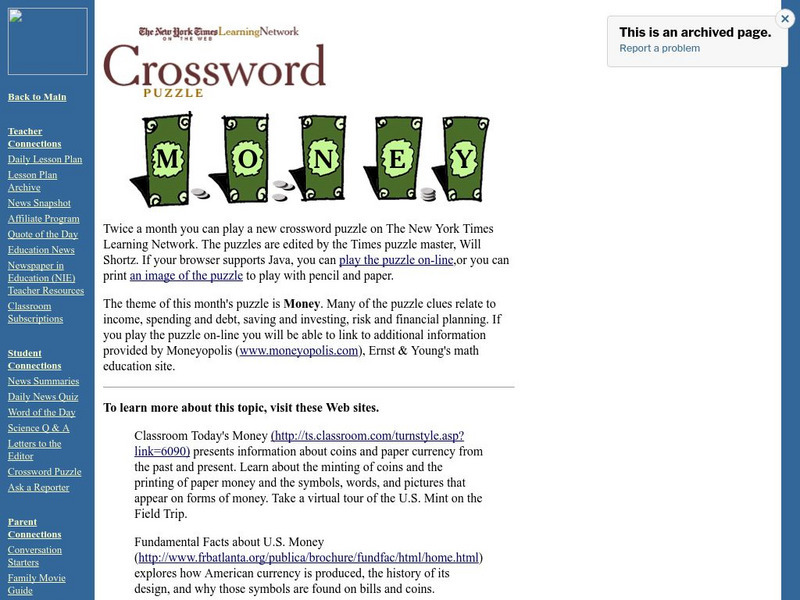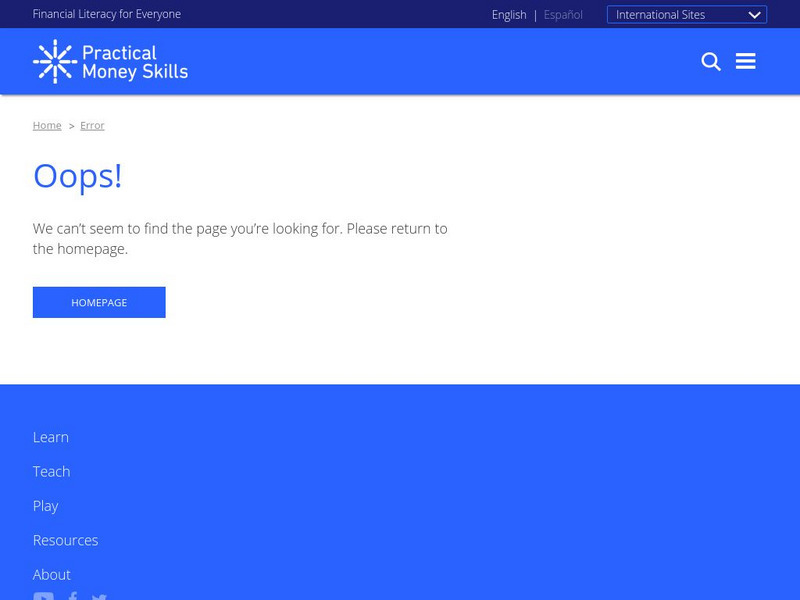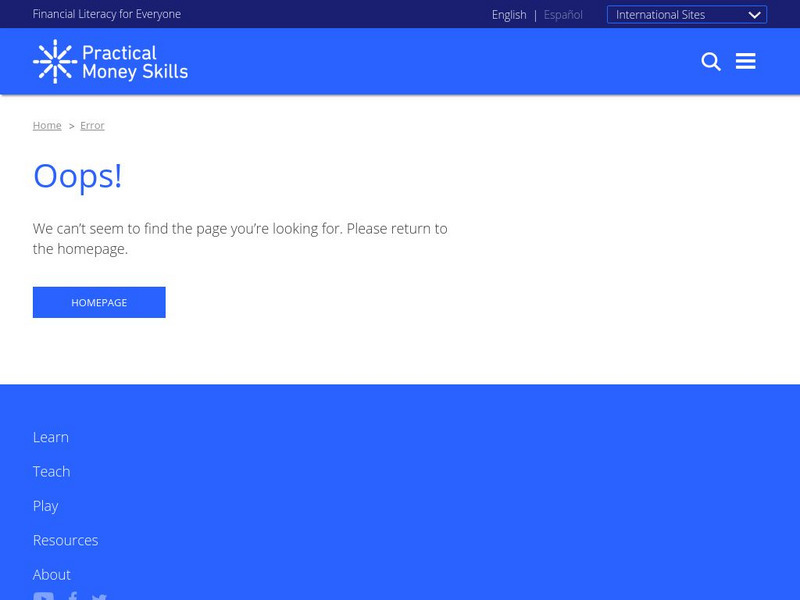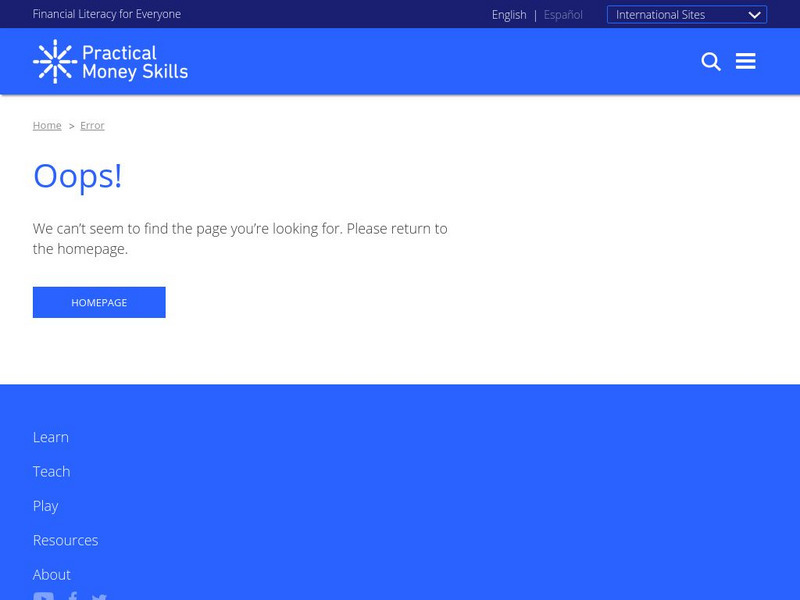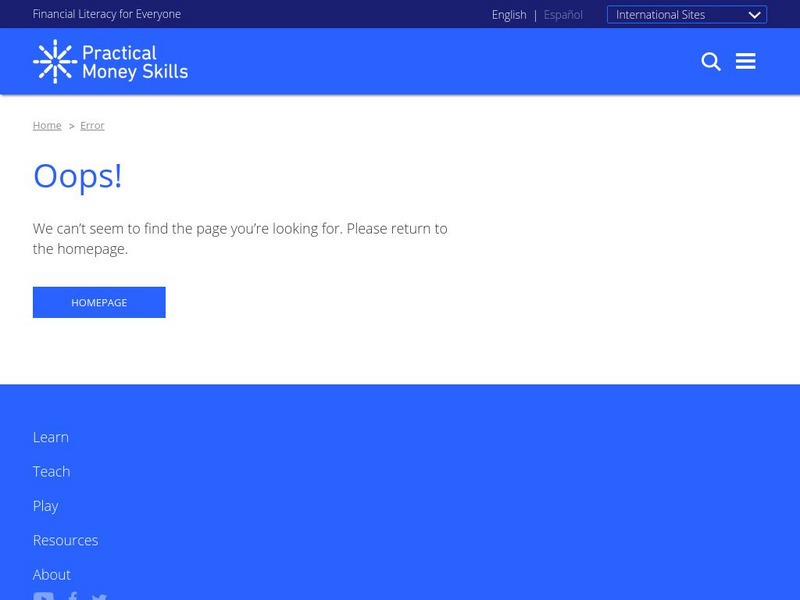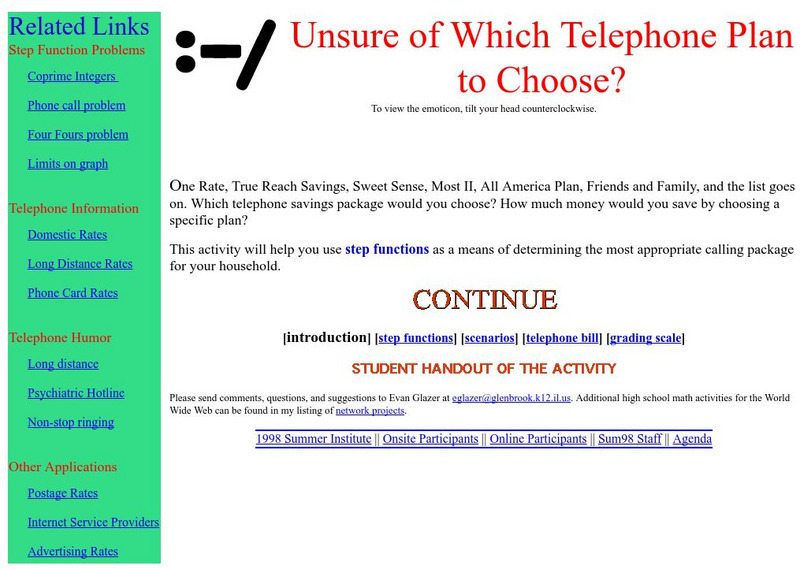Consumer Financial Protection Bureau
Consumer Financial Protection Bureau: Evaluating Savings Scenarios
By analyzing real-world scenarios, students practice making informed decisions about savings tools to meet financial situations and needs. Includes teaching guide, a handout on options for saving money, and a student worksheet that can...
Council for Economic Education
Econ Ed Link: A Penny Saved Is a Penny at 4.7% Earned
This is a lesson from EconEdLink where students learn about saving money. Includes activities and materials.
Other
Economic Awareness Council: Ben Knows $: Money Smart Activities for Kids [Pdf]
It is never to early to begin saving money. Use this printable workbook to help young students learn concepts like the difference between want and need, the difference between saving and spending, what banks do, and how to budget to...
Practical Money Skills
Practical Money Skills: Lesson Two: Spending Plans
This lesson introduces children to the concept of dividing their money into categories, namely "save," "spend," and "share" and presents activities that will help them understand that money is limited in quantity and must be divided for...
Consumer Financial Protection Bureau
Consumer Financial Protection Bureau: Saving Each Payday
Learners use a real-world simulation to learn how saving a little money each payday can be a successful strategy for saving. Includes teaching guide and student worksheet that can be filled in on a computer.
Consumer Financial Protection Bureau
Consumer Financial Protection Bureau: Exploring Savings Habits
Students learn about the benefits of forming their own savings habits and explore what it looks like to save a percentage of income.
USA Today
Usa Today: Money
USA Today's Money section covers the very latest in domestic and world economic news. Coverage also includes in-depth articles and editorials.
Consumer Financial Protection Bureau
Consumer Financial Protection Bureau: Saving for Post Secondary Education
Students use an online compound interest calculator to answer questions and create charts that show the value of saving money over time for future education goals.
New York Times
New York Times: Crossword Puzzle: Money
An interactive & printable crossword puzzle developed by the New York Times Learning Network. The theme of this puzzle is Money.
Genius Brands International
Secret Millionaires Club: Webisode Activities
Backed by Warren Buffett, "the world's most famous investor," the Secret Millionaires Club teaches children about saving and investing money, about how businesses and credit cards work, and about the personal qualities that support...
University of Missouri
Wise Pockets World: Wise Pockets Clubhouse for Students
As students read the stories in the library, they learn about earning money, spending and saving money, and a bit about borrowing and lending money as well. Each story is followed by a short quiz and a printable activity.
Other
At Home With Math: Activities for Parents and Kids
These ten math activities encourage parents and their children ages 5-11 to work with math in the context of everyday activities like taking turns, saving money, or getting somewhere on time.
Other
Ucce: Money Talks
This resource provides activities such as: savings video, youth money newletters, financial literacy games, related links, and a teacher section.
Council for Economic Education
Council for Economic Education: Learning, Earning, and Investing
This course is subtitled "Lessons for a New Generation." It includes twenty-one downloadable lessons with additional activities for each lesson. It covers a wide range of topics from basics such as "Why Save?" and "Invest In Yourself" to...
Practical Money Skills
Practical Money Skills at Home: Saving and Investing
This collection of activities offers practical strategies to help parents teach teens the basics of saving and investing. Using the suggested activities, parents can share facts about direct investing, mutual funds, and investment clubs...
Practical Money Skills
Practical Money Skills at Home: Saving and Investing
Teach children the value of saving and investing their money using these suggested ideas. Activity offers real-world experiences that will help children better grasp these concepts. Links to related websites and worksheets are included.
Council for Economic Education
Econ Ed Link: Money Comes and Goes
Students read two online stories that introduce them to the elements of a budget and show that a successful budget balances money coming in (income) with money going out (expenses and savings). Follow-up activities point out the value of...
Consumer Financial Protection Bureau
Consumer Financial Protection Bureau: Storing My Savings
Students read descriptions of common places to store their money and weigh the benefits and risks of each to decide which one(s) fit their financial goals.
University of Missouri
University of Missouri: Wise Pockets: Berenstain Bears' Trouble With Money
Using a Berenstain Bears' book, students are introduced to concepts such as spending, goods, services, income, saving, and interest. Lesson is detailed and has good activities. Includes questions about the story that teach students about...
University of Missouri
Wise Pockets: Personal Finance Lesson Plans, Grades 3 6
The Wise Pockets World Schoolhouse presents a dozen lesson plans based on children's books and teaching money management. All include lesson descriptions, cross-curricular connections, instructional objectives, activity sheets,...
Practical Money Skills
Practical Money Skills at Home: Allowance and Savings
Ideas to teach children the importance of saving and the value of an allowance using this activity. Suggestions for conveying these ideas include related worksheets to help children better grasp these concepts.
Practical Money Skills
Practical Money Skills at Home: Allowance and Work
This collection of activities focuses on strategies for teaching teens how to balance allowance, chores, school, and work. Also provided are practical tips for parents regarding signs to look for that may indicated earned money is being...
National Council of Teachers of Mathematics
The Math Forum: Unsure of Which Telephone Plan to Choose?
This online activity will help you use step functions as a means of determining the most appropriate calling package for your household.
Federal Reserve Bank
Federal Reserve Bank of St. Louis: The Piggy Bank Primer [Pdf]
A workbook for children on how to save and manage their money, and how to create a budget.


